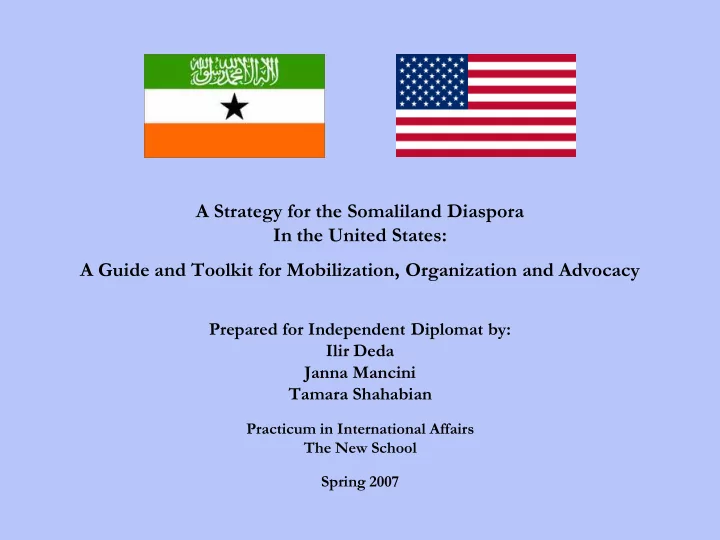

A Strategy for the Somaliland Diaspora In the United States: A Guide and Toolkit for Mobilization, Organization and Advocacy Prepared for Independent Diplomat by: Ilir Deda Janna Mancini Tamara Shahabian Practicum in International Affairs The New School Spring 2007
Somaliland: The Facts Pre-Independence • British Protectorate until June 26, 1960 • Somaliland voluntarily enters union with Somalia • Under union, Somaliland suffers war and state collapse • May 18, 1991, Somaliland declares independence after 31 years Post-Independence • Since independence, the government has maintained peace • Parliamentary government and internationally monitored democratic elections • Ratified secular constitution • No international recognition The Somaliland Diaspora • Somalilander communities are largest in the United Kingdom, Toronto and the United States • The 55,000 Somalilanders in the US are mostly congregated in 12 states (refer to map)
Focus of the Project To provide tools for the mobilization and organization of the Somaliland Diaspora in the US, so they can unify resources and efforts with their counterparts in Somaliland. Together, they can effect change and move closer to their mutual goal of international recognition of Somaliland’s independence.
Case Study: Eritrea • 1991 - declared independence following war with Ethiopia • Held UN-verified and Ethiopian-backed Independence Referendum in 1993 • Active diaspora: – “Diaspora tax” – Organized politically – Internet
Case Study: Kosovo • Undergoing “final status” process • Active diaspora: - Lobbying - “Tax” - Remittances - Unity for independence - Contributing to independence: patriotic duty of every Kosovar Albanian
Case Study: Nagorno-Karabakh • Unrecognized de facto state • Populated and controlled by ethnic Armenians • Located within the internationally- recognized borders of Azerbaijan • Democratically elected president and parliament • Heavy reliance on Armenia and the Armenian Diaspora • Active Diaspora: -Remittances -NGO Support -Fundraisers -Political & Media Advocacy
Case Study: Toronto’s Somaliland Diaspora • One of the most politically active Somali/Somaliland Diaspora communities in North America • MP Jim Karygiannis - Champion for Recognition - Business/Investment - Lobby US Government Representatives MP Jim Karygiannis with Somaliland Minister of Family & Social Affairs, Edna Aden Ismail
Recommendations for Somaliland Government Representative in DC Representative Dr. Sa’ad Noor’s achievements: - Success in establishing and maintaining communication with the US administration and other policy-makers - Single-handedly sustaining the visibility of Somaliland in Washington, DC Recommendations: • Establish an Office of the Republic of Representative of the Republic of Somaliland in DC Somaliland (right): Dr. Sa'ad Shiek • Provide Additional Staff Osman Noor with Minnesota Attorney General Mike Hatch • Allocate Funding to the Office • Cover the United Nations • Monitor Media coverage • Maintain Regular Contacts with Diaspora
Recommendations for Somaliland Diaspora in the US The Somaliland Diaspora can and must play a role in the pursuit of international recognition! • Create a unified umbrella organization • Create one go-to Somaliland website • Increase contact with US government officials • Coordinate regional and national communication • Increase contact with Somaliland representative in the US • Increase media contact • Raise funds
Toolkit: Engage the Media To increase visibility in the American media, the Somaliland Diaspora should employ the following tools: Suggested Methods of Correspondence • Distribute a Fact Sheet • Send out a Press Release • Commend Accuracy • Correct Inaccuracy • Send out a Media Advisory • Request a Meeting with an Editorial Board
Toolkit: Communicate with Policymakers • US citizens are encouraged to contact their political representatives • Constituencies have power - can influence policy • Somaliland Diaspora must take advantage of this opportunity • Political contacts will boost knowledge and interest in Somaliland • Cultivating political relationships will enable the furthering of Somaliland’s quest
Somaliland Communities in the US
Toolkit: Know the Importance of Fundraising The Somaliland Diaspora Has An Impressive Background Raising Funds • Financed elections in country • Donated funds to rebuild school and hospitals Funds Can Be Useful in: • Backing political campaigns • Hiring lobbying or public relations firms • Traveling to meet with politicians and policymakers
Project Summary I. Introduction II. Case Studies A. Eritrea B. Kosovo C. Nagorno-Karabakh D. Toronto’s Somaliland Community III. Recommendations for Somaliland Government Representative IV. Recommendations for American-Somaliland Diaspora V. Toolkit Step 1: Mobilize the Community Step 2: Engage the Media a. Sample Methods of Correspondence Step 3: Communicate with Policymakers a. How to Send Letters to Members of Congress Step 4: Know the Importance of Fundraising VI. Appendices A. A-Z List of Somaliland Organizations in the US B. List of Lobbying and Public Relations Firms in the US C. List of US Government Officials in Somaliland Diaspora Communities
Conclusion • Diasporas can play a vital role in helping homeland communities to achieve goals • The Somaliland Diaspora in the US can help achieve international recognition by uniting and organizing efforts towards one common goal • We hope our toolkit and recommendations can assist Somaliland in realizing its goal of international recognition
Recommend
More recommend